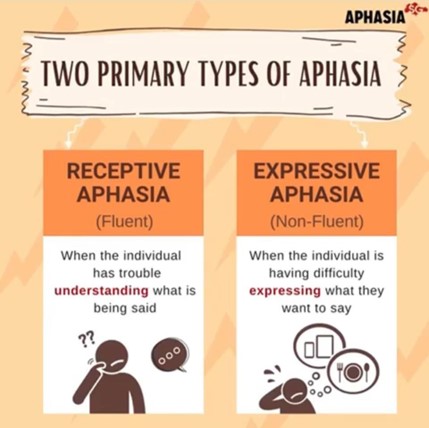A nurse is collecting data from a client who had a stroke and is unable to name common items.
The nurse should recognize that the client is experiencing which of the following types of aphasia?
Receptive aphasia.
Expressive aphasia.
Global aphasia.
Sensory aphasia.
The Correct Answer is B

This type of aphasia is caused by damage to the frontal lobe of the brain, which affects the ability to produce language.
People with expressive aphasia can understand speech and know what they want to say, but they have difficulty saying words or forming sentences.
They may speak in short phrases that require a lot of effort.
Choice A is wrong because receptive aphasia is a type of fluent aphasia that affects the ability to comprehend language.
People with receptive aphasia have difficulty understanding speech and may produce meaningless words or sentences.
Choice C is wrong because global aphasia is the most severe type of aphasia that affects both the production and comprehension of language.
People with global aphasia cannot speak many words and do not understand speech.
They also cannot read or write.
Choice D is wrong because sensory aphasia is not a common term for a type of aphasia.
It may refer to Wernicke’s aphasia, which is another type of fluent aphasia that affects the ability to produce meaningful language.
People with Wernicke’s aphasia can speak fluently but often use incorrect or invented words or phrases.
Nursing Test Bank
Naxlex Comprehensive Predictor Exams
Related Questions
Correct Answer is A
Explanation
This is because a frayed electrical cord can pose a serious risk of electric shock or fire to the client and the nurse.
The nurse should act quickly to eliminate the hazard and ensure the safety of the client and others.
Choice B is wrong because accessing the facility’s maintenance protocol is not the first action the nurse should take.
The nurse should prioritize removing the device from the room before following any protocol.
Choice C is wrong because reporting defective equipment is not the first action the nurse should take.
The nurse should prioritize removing the device from the room before reporting it to the appropriate authority.
Choice D is wrong because requesting a replacement device is not the first action the nurse should take.
The nurse should prioritize removing the device from the room before requesting a new one.
Correct Answer is D
Explanation
The correct answer is choice D. Flex hips and knees when assisting the client to a standing position.
Choice A rationale:
Raising the bed to waist level before moving the client is not recommended because it can increase the risk of falls and injuries. The bed should be at a height that allows the nurse to maintain proper body mechanics and ensure the client’s safety during the transfer.
Choice B rationale:
Pivoting on the foot farthest from the bed when assisting the client into the chair is incorrect. The nurse should pivot on the foot closest to the bed to maintain stability and control during the transfer.
Choice C rationale:
Standing on the client’s stronger side when moving the client into the chair is not the best practice. The nurse should stand on the client’s weaker side to provide support and prevent the client from falling towards their weaker side.
Choice D rationale:
Flexing hips and knees when assisting the client to a standing position is correct. This technique helps the nurse maintain proper body mechanics, reduces the risk of injury, and provides better support to the client during the transfer.
Whether you are a student looking to ace your exams or a practicing nurse seeking to enhance your expertise , our nursing education contents will empower you with the confidence and competence to make a difference in the lives of patients and become a respected leader in the healthcare field.
Visit Naxlex, invest in your future and unlock endless possibilities with our unparalleled nursing education contents today
Report Wrong Answer on the Current Question
Do you disagree with the answer? If yes, what is your expected answer? Explain.
Kindly be descriptive with the issue you are facing.
